Star anise is a beast in the kitchen.
You need it for that punch in pho or to jazz up your homemade chai.
Finding it can be like a mini treasure hunt at times, you know?
Here’s the scoop: sometimes, that spice rack isn’t stocked with what we need.
We’ve all been there, staring at the cabinet.
Thank goodness, there are stand-ins that won’t leave your dishes tasting bland.
We’re talking options that’ll keep your cooking on point.
Simple swaps that are probably chilling in your kitchen right now.
Ready to keep your flavors bold and your cooking adventurous?
What is Star Anise?

Star anise is a beautiful, star-shaped spice with a deep, licorice-like flavor.
It is native to China and Vietnam and is used in various cuisines, including Chinese, Thai, and Indian.
Star anise is the key ingredient in Chinese Five Spice powder and is often used to flavor meat dishes and steamed rice.
It can also be used to make delicious tea.
If you’ve never tried star anise, it’s worth seeking out.
You’ll be surprised by how much flavor it can add to your food.
Not only is star anise a delicious spice, but it also has many health benefits.
It is a good source of antioxidants and has boosted the immune system.
Star anise is also thought to have anti-inflammatory properties and can be used to treat digestive issues like indigestion and bloating.
If you’re looking for a tasty way to spice up your food and improve your health, star anise is a great choice.
The 5 Best Substitutes for Star Anise
Star anise is a unique spice known for its distinctive licorice-like flavor, used in various culinary creations and beverages.
However, if you find yourself without star anise or looking for alternative options, there are several substitutes available.
In this guide, we will compare the top 5 substitutes for star anise, discussing their key characteristics and suggesting proper ratios to help you find suitable alternatives.
| Substitute | Key Characteristics | Proper Ratio |
|---|---|---|
| Chinese Five-Spice Powder | A blend of spices including star anise, providing a balanced and aromatic flavor | Use an equal amount of Chinese five-spice powder as a substitute for star anise |
| Anise Seeds | Small seeds with a strong licorice flavor, resembling the taste of star anise | Use half the amount of anise seeds as a substitute for star anise, adjusting based on personal preference and desired level of flavor |
| Fennel Seeds | Similar to anise seeds, with a slightly sweeter and milder taste | Use half the amount of fennel seeds as a substitute for star anise, adjusting based on personal preference and desired level of flavor |
| Cloves | Intensely aromatic spice with a warm and slightly sweet flavor | Use half the amount of cloves as a substitute for star anise, adjusting based on personal preference and desired level of flavor |
| Mixture of Anise Seeds and Fennel Seeds | A combination of anise seeds and fennel seeds, creating a flavor profile similar to star anise | Use an equal amount of the mixture of anise seeds and fennel seeds as a substitute for star anise, adjusting based on personal preference |
Now, let’s dive into each substitute in more detail:
1 – Chinese Five-Spice Powder
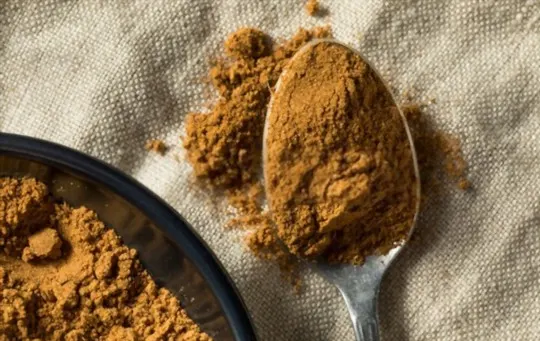
Chinese five-spice powder is a spice blend commonly used in Chinese cuisine.
The five spices in the mix are typically star anise, cloves, cinnamon, Sichuan pepper, and fennel seeds.
However, other spices, such as ginger or nutmeg may also be included.
The powder adds flavor to meats, vegetables, and rice dishes.
It can also be used as a dry rub for meats or as a spice for baking.
Chinese five-spice powder is available in most supermarkets.
- Key Characteristics: Chinese five-spice powder is a blend of spices, which typically includes star anise, providing a balanced and aromatic flavor. It can be a convenient substitute when star anise is not available.
- Proper Ratio: Use an equal amount of Chinese five-spice powder as a substitute for star anise. Adjust the quantity based on personal preference and desired level of flavor.
2 – Anise Seeds
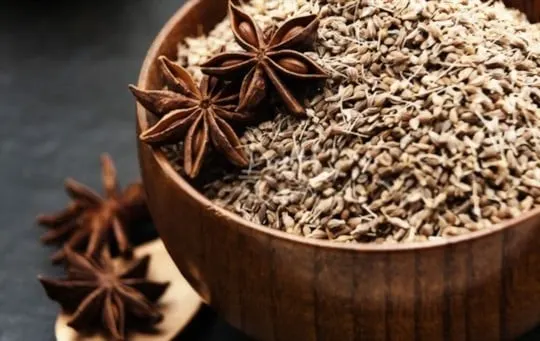
Anise seeds come from the fruit of the anise plant, which is native to the Mediterranean region.
The anise plant has been cultivated for centuries and is used for culinary and medicinal purposes.
The seeds have a sweet, licorice-like flavor and are commonly used in baking.
They can also be used to make a variety of liqueurs, including absinthe and ouzo.
In addition to their culinary uses, anise seeds are also said to have numerous health benefits.
They aid digestion, relieve gas and bloating, and increase milk production in nursing mothers.
Anise seeds can be found in the spice section of most grocery stores.
- Key Characteristics: Anise seeds are small seeds with a strong licorice flavor, resembling the taste of star anise. They can add a similar profile to dishes when star anise is not on hand.
- Proper Ratio: Use half the amount of anise seeds as a substitute for star anise. Adjust the quantity based on personal preference and desired level of flavor.
3 – Fennel Seeds
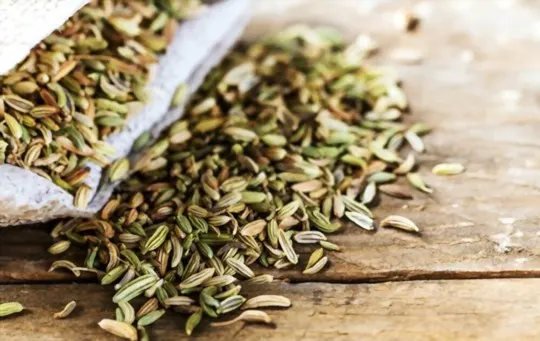
Fennel seeds are the dried fruit of the fennel plant, an aromatic herb that is native to the Mediterranean.
The seeds have a sweet, anise-like flavor and are used as a spice in both sweet and savory dishes.
Fennel seeds can be used whole or ground and often flavor fish, chicken, and vegetables.
In addition to their culinary uses, fennel seeds have a long history of medicinal use.
They have been used to treat indigestion, gas, and cramps and are sometimes still used in home remedies for these ailments.
Fennel seeds are also a popular ingredient in many commercial digestive aids.
While they have many benefits, fennel seeds should be used in moderation as they can cause bloating and flatulence when consumed in large quantities.
- Key Characteristics: Fennel seeds have a slightly sweeter and milder taste compared to anise seeds. While not identical to star anise, they can provide a similar aromatic touch to recipes.
- Proper Ratio: Use half the amount of fennel seeds as a substitute for star anise. Adjust the quantity based on personal preference and desired level of flavor.
4 – Cloves
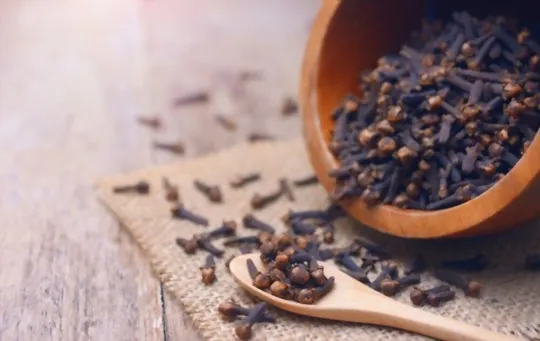
Cloves are the unopened flower buds of the evergreen tree Syzygium aromaticum, native to Indonesia.
The buds are harvested and then dried, at which point they turn brown.
Cloves have a strong, pungent flavor and are used as a spice in both sweet and savory dishes.
In addition to their culinary use, cloves have also been used medicinally for centuries.
They are known to have antibacterial and antifungal properties, and they can also be used to treat toothache pain.
Cloves are a versatile spice that can add depth and flavor to many different dishes.
- Key Characteristics: Cloves are intensely aromatic spice with a warm and slightly sweet flavor. Although different from star anise, they can impart a delightful aroma and taste to dishes.
- Proper Ratio: Use half the amount of cloves as a substitute for star anise. Adjust the quantity based on personal preference and desired level of flavor.
5 – Mix Anise Seeds and Fennel Seeds
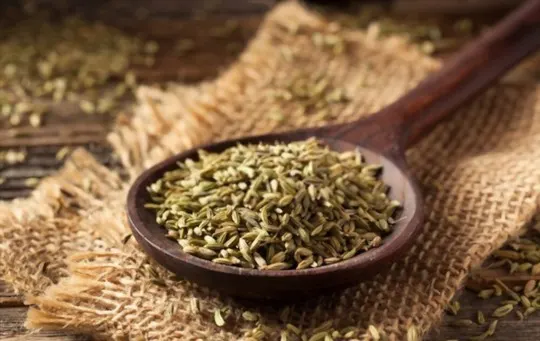
Anise and fennel are two prevalent spices that share a lot in common.
Both have a distinct licorice flavor, and they are often used interchangeably in baking and cooking.
However, there are some notable differences between these two spices.
Anise seeds are small and black, while fennel seeds are larger and brown.
Anise also has a sharper flavor, while fennel is more mellow.
Choosing between these two spices ultimately comes down to personal preference.
However, many people find that a mix of anise and fennel seeds provides the perfect balance of flavor.
Whether you use them in sweet or savory dishes, these two spices will add a touch of flavor to your meal.
- Key Characteristics: Combining anise seeds and fennel seeds creates a flavor profile that is similar to star anise. This mixture can be an excellent substitute, especially when you want to mimic the taste of star anise.
- Proper Ratio: Use an equal amount of the mixture of anise seeds and fennel seeds as a substitute for star anise. Adjust the quantity based on personal preference and desired level of flavor.
Conclusion
Star anise is a popular spice used in many Asian cuisines.
It has a sweet, licorice-like flavor and can be used whole or ground.
However, star anise can be difficult to find and can be expensive.
Luckily, several suitable substitutes can be used in its place.
Make sure to choose a substitute that will complement the other flavors in your dish.
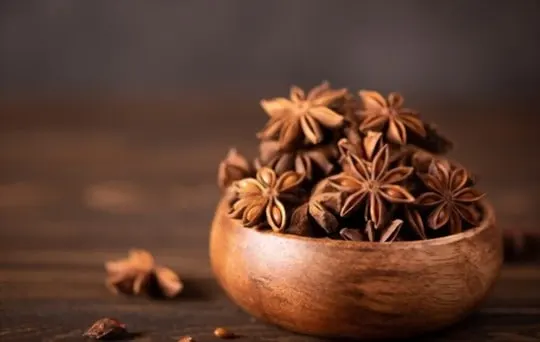
The 5 Best Substitutes for Star Anise
Ingredients
- Chinese Five-Spice Powder
- Anise Seeds
- Fennel Seeds
- Cloves
- Mix Anise Seeds and Fennel Seeds
Instructions
- Pick your favorite substitute from the list above.
- Follow cooking directions for your selected substitute with the proper ratio of ingredients.

Andrew Gray is a seasoned food writer and blogger with a wealth of experience in the restaurant and catering industries. With a passion for all things delicious, Andrew has honed his culinary expertise through his work as a personal chef and caterer.
His love for food led him to venture into food writing, where he has contributed to various online publications, sharing his knowledge and insights on the culinary world. As the proud owner of AmericasRestaurant.com, Andrew covers a wide range of topics, including recipes, restaurant reviews, product recommendations, and culinary tips.
Through his website, he aims to inspire and educate fellow food enthusiasts, offering a comprehensive resource for all things food-related.

Leave a comment